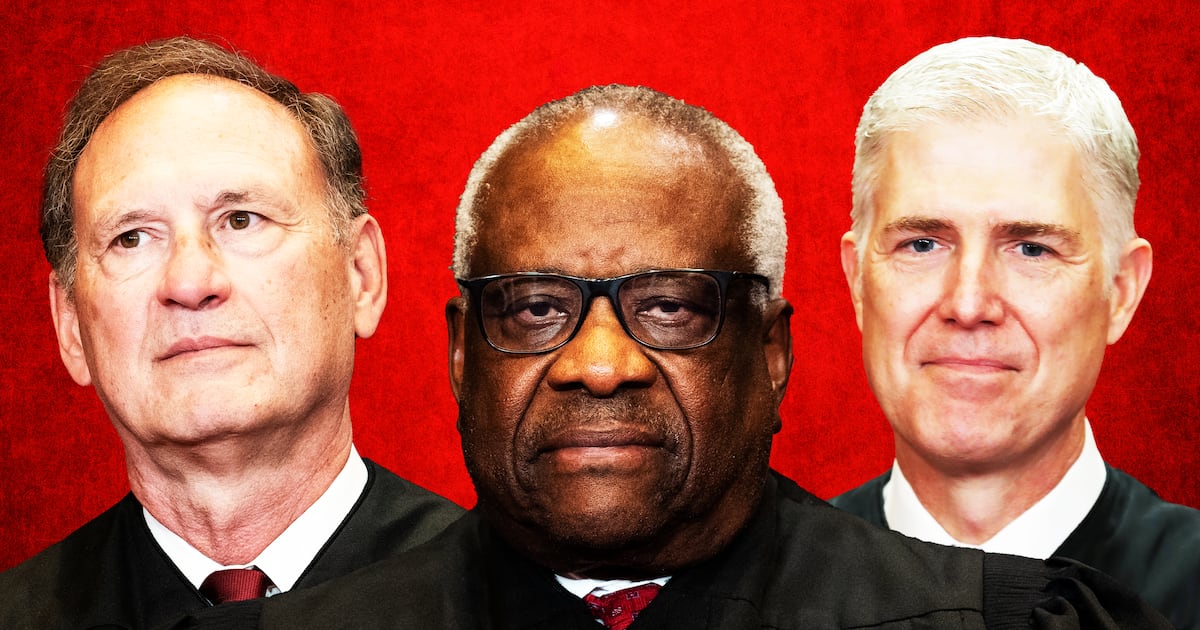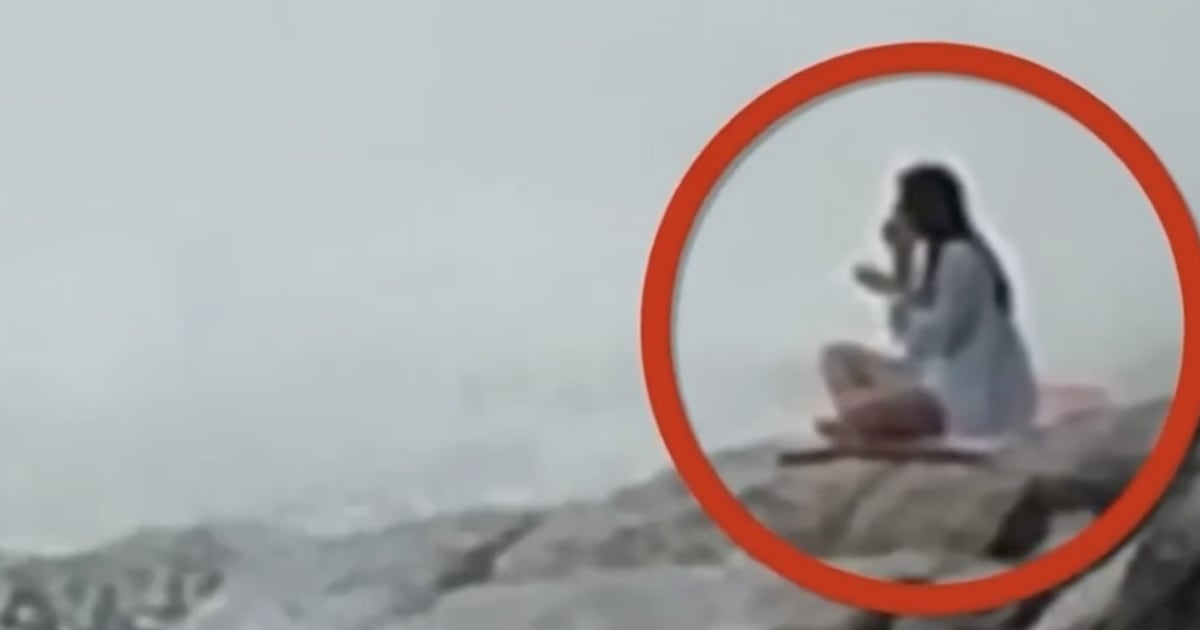“Save a little for my funeral, OK?”
Thus David Letterman, during his final Late Show on CBS (which ran 20 minutes longer than usual, nearly an hour into Thursday morning), acknowledged that the various national expressions of grief and sanctification concerning his retirement from network talk-show television have been slightly “crazy,” as he put it, and “over the top.”
After all, the dude isn’t dead. Far from it. For a quintuple bypass survivor of 68, he’s a fine physical specimen, trim and energetic even if his hairline is gray and receding—still game to run his ritual 20-yard dash across the stage at the beginning of his Late Show swan song Wednesday night.
ADVERTISEMENT
And yet, like Mark Twain’s beloved scamp Tom Sawyer, this “boy from a small town in Indiana,” as Late Show announcer Alan Kalter introduced his boss for the last time to a riotous audience, has enjoyed the rare privilege over the past several weeks of being present for all the adoring eulogies.
“Dave! Dave! Dave! Dave!” the crowd in the Ed Sullivan Theater chanted and clapped, having leapt to its feet for a sustained standing ovation, prompting a bashfully smiling Letterman to warn, after several unsuccessful attempts to get them to take their seats, “See, now what happens is we don’t have time for the giving-gifts-to-the-audience segment.”
Letterman, sporting clear-plastic spectacles, was dressed for the occasion in a sleek black suit, crisp white shirt and blue-patterned tie—less funereal than businesslike. The audience, by the way, included Letterman’s wife, Regina Lasko, and their 11-year-old son Harry, who looked less than ecstatic and possibly embarrassed, understandably, when his dad proudly pointed him out to the crowd.
As his legions of mourners have repeatedly declared, Letterman was the groundbreaking entertainer who reinvented the late-night talk-show form that had been established by his putative mentor and idol, the Tonight Show’s Johnny Carson. Letterman, who hosted a mis-scheduled morning show that NBC canceled after four months in 1980, and in 1982 launched his wildly successful Late Night 12:30 a.m. program that followed Tonight before he jumped to CBS in 1993, replaced standard joke-telling (never his strong suit) with lightning wit and searing irony. Yet he didn’t turn up his nose at the sheer slapstick joy of a stupid pet trick, a goofball grin, a monkey-cam or an exploding TV set (hurled to the sidewalk from a Manhattan rooftop, natch).
And instead of basking comfortably in showbiz glitz and glamour—Johnny Carson’s M.O.—Letterman and his loyal bandleader and sidekick, Paul Shaffer, pioneered new territory in subversive comedy and satire—puncturing pretensions, calling out bullshit, and treating celebrity guests like the flawed but fun and talented human beings they were. (Some of these celebrities were baffled or even frightened by Letterman’s zany and unpredictable hosting behavior; they were initially reluctant to join in, having been sent by their publicists, after all, not to expose themselves to a potentially scary situation in front of millions of viewers, but simply to shill for their various movies, sitcoms and albums.)
Still, the recent eruption of near-universal acclaim for Letterman has come from his once-apprehensive showbiz peers, pop-cultural critics and just-plain fans—including a couple of presidents of the United States, Bill Clinton and Barack Obama, who sat beside him and bantered as equals as his 35-year career has drawn to a close.
Indeed, certifying his status as an American icon, Letterman’s producers managed to wrangle four of the five living presidents—George Bush I, George Bush II, Clinton and Obama—to participate in the final program. (Occasional Late Show guest Jimmy Carter, the 39th president who has been ailing, was a no-show.)
In the cold open right before Shaffer’s CBS Orchestra struck up the Late Show theme, each Leader of the Free World echoed Gerald Ford’s historic words as he took control of the Oval Office in 1974 from the disgraced Watergate conspirator Richard Nixon.
“Our long national nightmare is over,” the presidents repeated in a mock-solemn deadpan. The elder Bush, at 90, looked and sounded a tad frail, and the overall effect of the comic conceit was less humorous than Mount Rushmore-ish, yet it underscored the importance of Letterman’s body of work—more than 6,000 shows on NBC and CBS—and the poignancy of his departure.
Aside from a monologue on the theme of aging, retirement, and bidding farewell—“It’s beginning to look like I’m not gonna get the Tonight Show,” Letterman quipped, mining a familiar but painful comic vein (and the night’s only apparent reference, a veiled one at that, to Letterman’s arch-rival Jay Leno)—the program also featured a brief video of the star, in gym shorts and a sweatshirt, interacting in the office with his affectionate staff; a charming montage of Letterman trading stories and quips with kids, and not patronizing them in the least; and a video of a hilarious June 1996 expedition to a Taco Bell in suburban New Jersey, where Letterman, in a Taco Bell uniform and taking and mostly mistaking drive-thru orders, alternately confused and enraged unwitting customers.
The latter was the sort of real-world comedy that was once a reliable staple in Letterman’s bag of laughs, but something he seldom if ever risked in recent years as he entered his 60s and increasingly stayed behind his desk. Meanwhile, as the Foo Fighters performed their hit “Everlong,” one of Letterman’s favorite tunes, a breathlessly-paced photo and video montage demonstrated that Letterman had interacted with just about every significant pop-culture figure on planet Earth. And for fans of the old NBC show, frequent video appearances by the late Calvert DeForest, who played the endearingly incompetent recurring character Larry “Bud” Melman, had to be deeply satisfying.
A highlight of the show was the final Top 10 List, for which regular Late Show guests from Alec Baldwin to Tina Fey to Peyton Manning to Barbara Walters to Jim Carrey recited “the top 10 things I always wanted to say to Dave.” Letterman favorite Bill Murray, of course, was also in the mix.
The star laughed heartily at their recitations and thanked them effusively all the way through.
A sampling:
No. 9. Walters: “Dave, did you know that you wear the same cologne as Muammar Khadafy?”
No. 8. Steve Martin: “Your extensive plastic surgery was a necessity—and a mistake.”
No. 7. Jerry Seinfeld (who showed up in a tuxedo): “Dave, I have no idea what I’ll do when you go off the air. ... You know, I just thought of something—I’ll be fine.”
No. 5. Chris Rock: “I’m just glad your show is being given to another white guy.” (“You know, I had nothing to do with that,” Letterman shot back, although later in the program he eagerly praised Stephen Colbert, his designated successor.)
No. 4 Julia Louis-Dreyfus: “Thanks for letting me take part in another hugely disappointing series finale.”
Letterman’s Late Show finale, however, was only disappointing to those who expected an outward display of raw emotion; on his final Tonight Show in May 1992, Johnny Carson—two years younger than Letterman is today—was melancholy and at points near blubbering.
By contrast, Letterman seemed serene and lighthearted, by all appearances happy with his decision, looking forward to his next phase in life—and gratified that, whatever else can be said, he outlasted Jay Leno.






